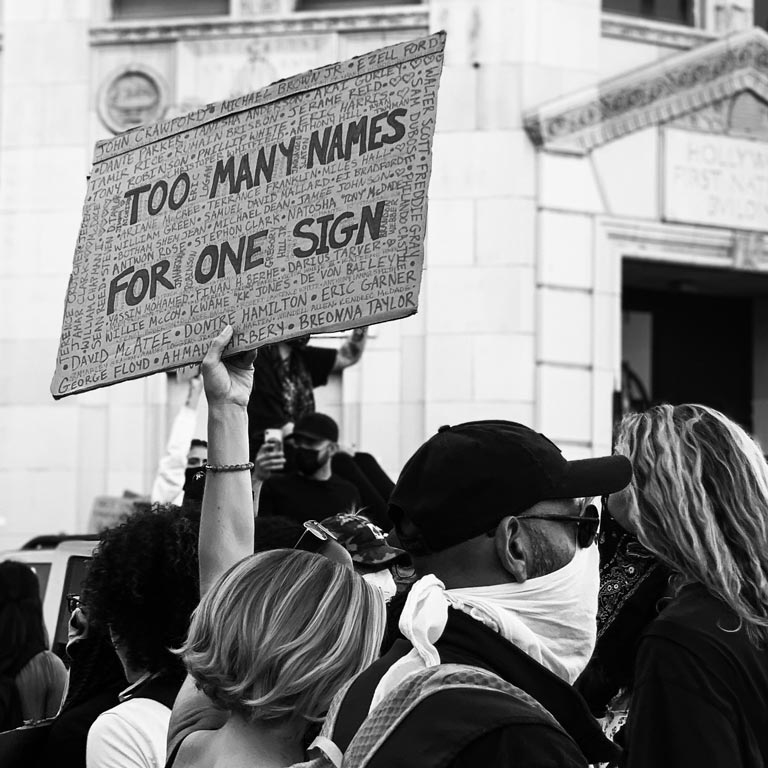As the nation and our community struggle to make sense of racial inequities, police brutality and social injustices, IU South Bend faculty, staff and alumni are creating and nurturing initiatives to foster meaningful dialogues and create awareness on campus and in their communities around these very difficult, divisive issues.
“We often feel helpless,” said IU South Bend faculty Professor of Psychology and Director of the Social Action Project Dé Bryant. “This problem is so big. There is nothing I can do to change it. Yet, all change is individual change and we are seeing it now.”
To foster difficult conversations around racism and racial inequities, Bryant, a core member of the local Black Lives Matters chapter, created Black Lives Matter-South Bend Arts and Justice Curriculum that began September 9. Five podcasts were developed to explore the complexities of racial traumas. Attendees are invited to participate by responding to predetermined prompts in the podcast and upload their works exploring the topic of each podcast to a virtual gallery. The two “galleries” of interactive elements provide insights to shape remedies related to burnout from racial trauma.

“Art is a way to get into these very difficult conversations,” Bryant said. “The issues are so emotional, in order for us to get people from different perspectives to have meaningful dialogue, we have to find some common element. Art does that.”
Assuring A Campus Culture of Diversity, Equity, and Inclusion
To provide input to campus programming and systems surrounding diversity, equity and inclusion, IU South Bend established a Diversity, Equity and Inclusion (DEI) Advisory Committee. “We hope to use this group, which represents all campus units and varying identity groups, to keep a pulse on the campus climate but also proactively plan and evaluate campus efforts centrally surrounding diversity, equity and inclusion,” said Chancellor Elrod.
Vice Chancellor of Student Affairs and Diversity and Dean of Students, Monica Porter explained, “The goals of the committee this year are to establish a culture of continuing assessment of programs, lift up the campus programming efforts centrally, and host a large program in the spring to help create greater diversity, equity, and inclusion education and awareness in our community. We are also researching and identifying the need for a space where diversity can be supported and celebrated on the IU South Bend campus.”
In June, IU South Bend’s Civil Rights Heritage Center (CRHC) held a significant virtual event entitled “Perspectives on the Current Uprisings.” The Zoom event attracted over 200 participants from all ages and walks of life. The participants were invited to listen to an intergenerational panel discussion on the current racial uprising. “We wanted the panel to represent experiences from multiple generations to facilitate conversations that we all need to be having,” said Darryl Heller, director of the Civil Rights Heritage Center and assistant professor of Women's and Gender Studies.
The CRHC welcomed Kailee Scales, managing director of the Black Lives Matter (BLM) Action Network Fund and international BLM Network, Inc.; Brother Sage Gillam, a lifelong national activist focused on African American freedom with a distinguished history working with Historically Black Colleges and Universities and other civil rights and social justice organizations; Nasir Wells, a 2020 Riley High School graduate attending Indiana University Bloomington; and Nadia Hannah, a student from Clay High School who recently gave a stirring, inspiring speech at one of the local Black Lives Matter protest rallies.
“Like the protests in the ‘60s, the young people are the leadership in the current uprisings,” said Heller. “It’s very heartening that the protests are also multi-racial. The issue of race is becoming much more front and central in the country for all people.”
IU South Bend Alum’s Performance Sparks Awareness
In Atlanta, Marlon Burnley, BFA’15 (Theatre), performed a 10-minute monologue written by Avery Sharp, “Child Sacrifices on the Alter of Uncle Sam” for a virtual audience of over 200 people. The performance was part of the monthly virtual Zoom dinner party series “Equitable Dinners,” produced by Out of Hand Theatre. His character tells the story of, after both his parents died, he spent his childhood in foster care, abused by both adults and children but mostly by the system itself.
“I was shocked about how much I didn’t know,” said Burnley. “I was very conflicted that I was learning about racial inequities in the foster care system at the same time I was performing a monologue about it.”
Burnley was cheered by the diverse audience the event attracted. “It was super-exciting to see 200-300 non-black and brown people participating in this event,” he said. “The movement feels different this time.”
Following the performance, participants broke out in smaller virtual group discussions. “They were eager to be learning and growing,” said Burnley.
Such conversations will continue, around the world and around campus. This fall the IU South Bend Alumni Association is partnering with the IU South Bend School of Social Work and the Civil Rights Heritage Center to bring a series to alumni, campus, and the broader community. “Examining Power, Oppression, and Complicity: A Community Dialogue” is a series of conversations addressing our personal, interpersonal, institutional, and cultural responsibility to stand against racism.
There is work to be done. IU South Bend is committed to being part of the solution.

